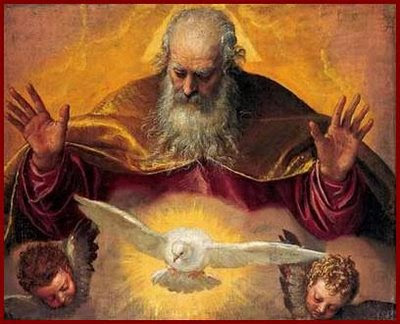An excerpt from Joseph Ratzinger's Images of Hope: Meditations on Major Feasts (Ignatius Press, 2006):
The Holy Spirit points to the Trinity, and thereby he points to us. For the trinitarian God is the archetype of the new united humanity, the archetype of the Church, as the prayer of Jesus may be seen as its word of institution: "that they may be one, even as we are one" (Jn 17:11b, cf. 21f.). The Trinity is measure and foundation of the Church. The Trinity brings the word of creation day to its goal, "Let us make man in our
image, after our likeness" (Gen 1:26). In the Trinity, mankind, which in its disunity became a counter image of God, should become once again the one Adam, whose image, as the Fathers say, was defaced by sin and now lies about in pieces. The divine measure of man should again come to prominence, unity, in it, "as we are one". So the Trinity, God himself, is the archetype of the Church. Church does not mean another idea in addition to man, but rather man on the way to himself. If the Holy Spirit expresses and is the unity of God, then he is the real vital element of the Church in which distinction is reconciled in togetherness and the dispersed pieces of Adam are fit together again. ...
A tongue of fire has been added to being human. We must now correct this expression. Fire is never something that is simply due to another and therefore exists beside him. Fire burns and transforms. Faith is a tongue of fire that burns us and melts us so that ever more it is true: I and no longer I. Whoever, of course, meets the average Christian of today must ask himself: Where is the tongue of fire? That which comes from Christian tongues is unfortunately frequently anything but fire. It tastes therefore like stale, barely lukewarm water, not warm and not cold. We do not want to burn ourselves or others, but in this way we keep distant from the Holy Spirit, and Christian faith deteriorates into a self-made world-view that as far as possible does not want to infringe on any of our comforts and saves the sharpness of protest for where it can hardly disturb us in our way of life. When we yield to the burning fire of the Holy Spirit, being Christian becomes comfortable only at first glance. The comfort of the individual is the discomfort of the whole. When we no longer expose ourselves to the fire of God, the frictions with one another become unbearable and the Church is, as Basil expressed it, torn by the shouts of factions. Only when we do not fear the tongue of fire and the storm it brings with it does the Church become the icon of the Holy Spirit. And only then does she open the world to the light of God. Church began as the disciples assembled and prayed together in the room of the Last Supper. Thus she begins again and again. In prayer to the Holy Spirit we must call for this anew each day.
